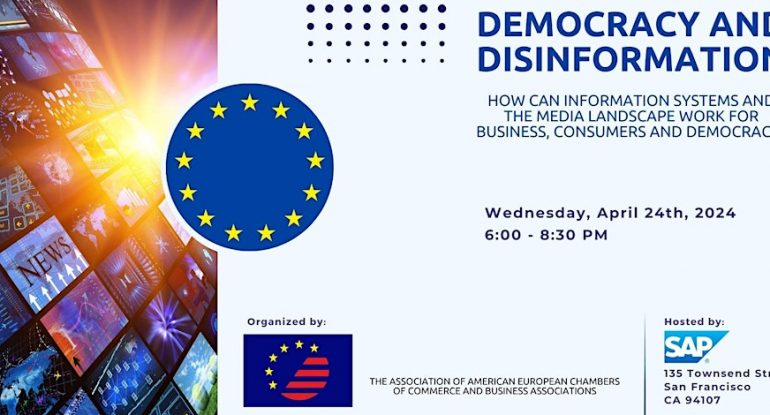
Democracy and Disinformation
- AAECCBA
- 24 April, 2024 18:00
- 24 April, 2024 20:30
- San Francisco / California
The American-European Chambers of Commerce and Business Associations invites you to a timely discussion about Democracy and Disinformation.
Reliable information is vital for a prosperous economy and democracy. Business leaders, public officials and voters all require reliable information on which to base their decisions. Venerated news organizations and trusted local outlets have lost subscribers and viewers to a panoply of platforms and influencers peddling misinformation, disinformation, fringe ideology, and conspiracy.
Artificial Intelligence-driven tools such as generative AI promise powerful new efficiency gains but also pose new threats when in the hands of bad actors.
Influence is Profitable
Our every movement online is being commodified. The lines between fact and fiction are blurring and, in many cases, being intentionally blurred for profit. Marketeers harvest likes and dislikes to target us with tailored messaging. On the growing stage of online influencers, ambitious individuals increase their following through extreme, unfounded positions while others aim to misinform and manipulate for nefarious purposes.
But what about the Foundations for Prosperity?
History reveals that societies thrive in periods of peace, and peace tends to persist between democracies engaged in commercial and cultural exchange. Vibrant economies rely on the rule of law, the free flow of ideas, and broad-based access to essential public services.
What are the solutions – and business models – for lifting trustworthy information above the mire of disinformation?
Speakers:
- Andy Pergam – Executive and innovator at the nexus of media and technology, particularly focused on access to information, AI, emerging tech, and platform governance. Andy helped establish the Oversight Board — a global, independent, quasi-judicial institution designed to hold Meta to account on content and social issues. He headed new ventures while on the executive team at local publisher McClatchy and was a senior editor at The Washington Post. He’s co-founder of Camber, an organization design firm that helps tech and media companies launch and implement new initiatives. He holds a Master’s Degree from the Columbia Journalism School.
- Florence G’sell – Professor of private law, University of Lorraine, leads the Digital, Governance and Sovereignty Chair, Sciences Po, and currently visiting professor at Stanford’s Cyber Policy Center’s program on the Governance of Emerging Technologies. With a background in tort law, judicial systems and comparative law, Florence focuses on digital law and issues related to the regulation of online platforms, the way law can address new technologies (Blockchain, Metaverse), the notion of digital sovereignty and, more generally, digital policies in the EU and the US. She has edited and published several books on digital issues, including Le Big Data et le Droit (Dalloz, 2021) and Justice Numérique (Dalloz, 2022).G’sell graduated from Sciences Po and is admitted to the Paris Bar. She obtained her PhD in private law from the University of Paris 1 Panthéon Sorbonne and holds the French “agrégation de droit privé et sciences criminelles”.
- Nolwenn Godard – Software executive with experience in the private and public sectors (from Sofi, PayPal, and Ubisoft to the California State). While Director of the California Office of Data and Innovation, she had the opportunity to develop Governor Newsom’s Executive Order N-12-23 on Generative Artificial Intelligence (gen AI) and the State of California Benefits and Risks of Generative Artificial Intelligence Report, as well as to implement the Equity Executive Order N-16-22. She has served as Co-President for the Alliance for Inclusive Artificial Intelligence at UC Berkeley’s Haas School of Business, which believes that the future of relevant, unbiased, innovative, and ethical analytics will be built with diversity and inclusion. She earned a Master of Business Administration degree from ESSEC Business School.
- Alexander Schaefer – Vice President of Engineering – Artificial Intelligence at SAP, and Head of the SAP Innovation Center North America. He leads a team with the mission to build relevant, reliable, and responsible Business AI and to closely collaborate with the AI ecosystem in the Silicon Valley, both with universities and startups. He has a background in software engineering and throughout his career worked on a variety of innovation topics, including in-memory database technology, distributed ledger technology, AI/ML applications, reinforcement learning, and generative AI. He holds a Master’s degree in Computer Science from the Hasso Plattner Institute, University of Potsdam.
Moderator:
Tracey Grose – Founding Principal, Next Curve Strategy and Vice Chair, GABA Board of Directors. Tracey helps leaders concretize strategic vision into actionable comprehensive and sustainable initiatives. She works with CEOs of mid-size companies and nonprofit organizations as well as public sector leaders in the US and Europe. She helps energize teams to boost innovation and prepare for growth. Tracey also assists European companies in gaining foothold in Silicon Valley through the development of partnerships or the search, due diligence, closing, and integration of a US-based company. Tracey holds a Master’s Degree from the Goethe University Frankfurt in Political Science with minors in Economics and Sociology.
Complimentary appetizers and drinks will be served.
